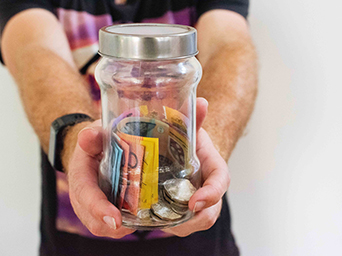We’ll show you how to handle your inheritance and perhaps also use some of it to make a long-term investment.
Who actually inherits in Switzerland and how much? There is little official information available about this. But a The link will open in a new window study does indicate that around CHF 63 billion was inherited in Switzerland in 2015. That is roughly equivalent to the amount that all private individuals in Switzerland combined save in a year. That’s a huge amount. Yet, inheritances are rarely distributed equally – 35% of all inheritances amount to between CHF 0 and CHF 50,000 and are then allocated to several heirs. This means lots of people are inheriting small amounts and few are actually inheriting a lot. Inheritances are usually subject to tax (inheritance tax). This depends on the amount of assets inherited and is governed at cantonal level. Spouses, registered partners and direct descendants are exempt from this tax in most cantons. Greater assets can be generated, even from small inheritances of just a few thousand Swiss francs. There are many ways of using an inheritance.
You are here:
Inherited money – what now?
Anyone considering investment can, for example, invest money on a monthly basis, top up their portfolio annually or make a single direct investment. The latter option is often pursued when money is inherited. Inheritance law in Switzerland provides for statutory entitlement which guarantees direct relatives of the deceased a share of the estate. This means the chance of receiving an inheritance is high. What approach should you adopt when this actually happens? Suddenly coming into a lot of money can present a challenge for many people.
Inherited money? Then ask yourself these questions
Anyone who receives money from an inheritance is faced with an unfamiliar situation – freely disposable assets are suddenly available. What is
- Your financial situation? Do you have any debts?
- How is your retirement planning going? Could you use the money to make up any contribution gaps?
- Is there a long-cherished dream you’d like to fulfil?
- Would you like to invest money – perhaps for the first time?
Making a dream come true with unexpected money is a completely legitimate option. But also think about whether you could use the inheritance – or what’s left of it – to repay debts, to top up retirement planning or for investment. Depending on what you aim to achieve longer-term, investing your inheritance may be a good option.
Even small amounts are worth investing
Inheritances are generally ideal for financial investment: you can’t usually pre-plan, budget for or even anticipate the arrival of this money, which means you can get by without it again for a long period of time. It’s an ideal opportunity to acquire knowledge about investment. Good returns can be generated, even by investing small amounts over the long term. The same applies to inheritance as to other forms of investment – invest it in line with your investment strategy.
You could use your inheritance to diversify your portfolio more broadly. In this case, investing in funds may be a wise move. You may want to use your inheritance to take your very first steps into the world of investment – and not by investing all your capital in one go, but in gradual steps. A funds saving plan with regular payments may be a good option here. This also allows you to minimize the risk of investing at the wrong time – and possibly paying too much for your investments. Or you could use your new assets to deliberately pursue a different investment strategy to your existing ones – you may wish to invest this new capital in a way that offers the highest possible returns and be willing to accept greater risks in return. When deciding what’s the best financial investment to meet your requirements and goals, your advisor would be pleased to help you, no matter how much money you have inherited.
Don’t overlook retirement provision.
Different goals take priority depending on your circumstances when you receive the inheritance. Always keep retirement provision in the back of your mind. You could perhaps use some of your inheritance to pay into your pillar 3a or to purchase additional benefits from your pension fund? Here it’s advisable to check the terms and conditions carefully before deciding whether it’s a viable option.
Heirs face many challenges when they receive an inheritance, which can completely change their financial situation all of a sudden. This entails many obligations, but also presents lots of opportunities. An inheritance may be a good way of entering the world of financial investment. As with all forms of investment, if you receive an inheritance you should firstly decide how much you wish to invest and for how long, and then combine various types of investment as far as possible. Depending on how much you inherit, you should’t forget to treat yourself – using an inheritance to make a dream come true or investing it in training or education isn’t a bad idea. If you’re looking to generate a long-term return on your inheritance, you should look into a range of investment opportunities to benefit in the longer run.








